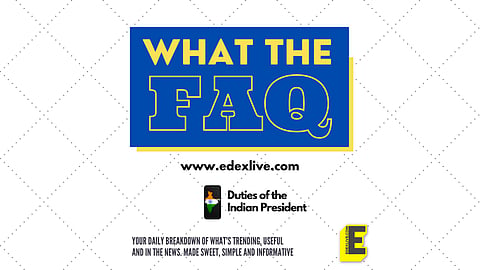

India is all geared up to get a new President today. Are you? It’s a tough decision to choose between NDA’s Draupadi Murmu and the Opposition’s Yashwant Sinha. Who do you think it will be? There is definite excitement in the air. And, why not? It’s the President of India after all! But what does a President actually do? Well, of course, he or she is the head of a country, but what duties do they perform? Let’s brush up our knowledge a bit, and take a look.
What are the duties of the Indian President?
The President of India is the Head of State of the Republic of India. He is also the Commander-in-Chief of the Indian Armed Forces. Article 52 of the Indian Constitution states that there is a need for a President in India (There shall be a President of India). And it is interesting to note that the office of the President was created only after India became a republic on January 26, 1950, after the constitution came into force.
The primary duty of the President is to preserve, protect and defend the Constitution and the law of India. He/she is the common head of all independent constitutional entities, which means that the President has executive, legislative and judiciary powers. His/her legislative power includes being the head of the Parliament of India, in which all the legislative powers are vested. The president is in charge of the parliamentary proceedings, facilitating the law-making process and if required, he/she can dissolve the Lok Sabha. According to Article 53 of the Constitution, all the executive powers are directly vested in the President, and he will execute them with the help of a Council of Ministers. The President is in charge of appointing the Chief Justice of India and other judges on the advice of the Chief Justice.
What other special powers does the President have?
The President appoints the Prime Minister and the Council of Ministers and distributes portfolios to them on the advice of the Prime Minister. The Comptroller and Auditor General (CAG), the Chief Election Commissioner (CEC) and other ECs, the members of the Union Public Service Commission (UPSC) and its chairman, all the officers of the All India Services (IAS, IPS, IFoS) and the Chief Minister of the National Capital Territory of Delhi are also appointed by the President.
The President is in charge of the Annual Financial Statement or the Union Budget. He/she is also responsible for constituting a Financial Commission every five years. The President can declare war or condone peace when the situation calls for it. He/she can also grant special pardons and most importantly, can declare an Emergency.
How is a President elected?
A President is elected under the following conditions:-
1. On the expiry of their term
2. By reason of death
3. By reason of resignation
4. Removal by the Supreme Court
5. Removal by impeachment
At present, the term of the incumbent President Ram Nath Kovind is expiring. As per the procedure, the nominations of candidates are made days before the election. There is a special procedure for counting the votes in the Presidential election. The election started on July 18 and the counting of the votes has already begun at 11 am in Room 63 of the Parliament House.
What next after the results are declared?
After the results are announced, the new President will take the oath on July 25, as the five-year term of Kovind ends on July 24. The President takes an oath in the presence of the Chief Justice of India, as required by Article 60 of the Indian Constitution. After the oath-taking ceremony, the President assumes his/her office. The country will get its 15th President today, July 21, and if Droupadi Murmu wins, she will be India’s first tribal President. She will also be the first president of India who was born after Independence. It has been reported that she has garnered the support of many during the elections.
Who are some of the most famous Presidents in India?
Going back along the timeline, incumbent President Ram Nath Kovind is the first Dalit President of India. Pratibha Patil elected in the year 2007 was the first woman President of the country. The great scientist Dr APJ Abdul Kalam surely mandates a mention here. Before him, Neelam Sanjeeva Reddy remains the youngest President of India to assume office till date.
And finally, there is Dr Sarvapalli Radhakrishnan who was a great teacher and the second President of India, along with the first, Rajendra Prasad, who is the longest-serving Indian President till date, and the only one to have assumed the office twice.
